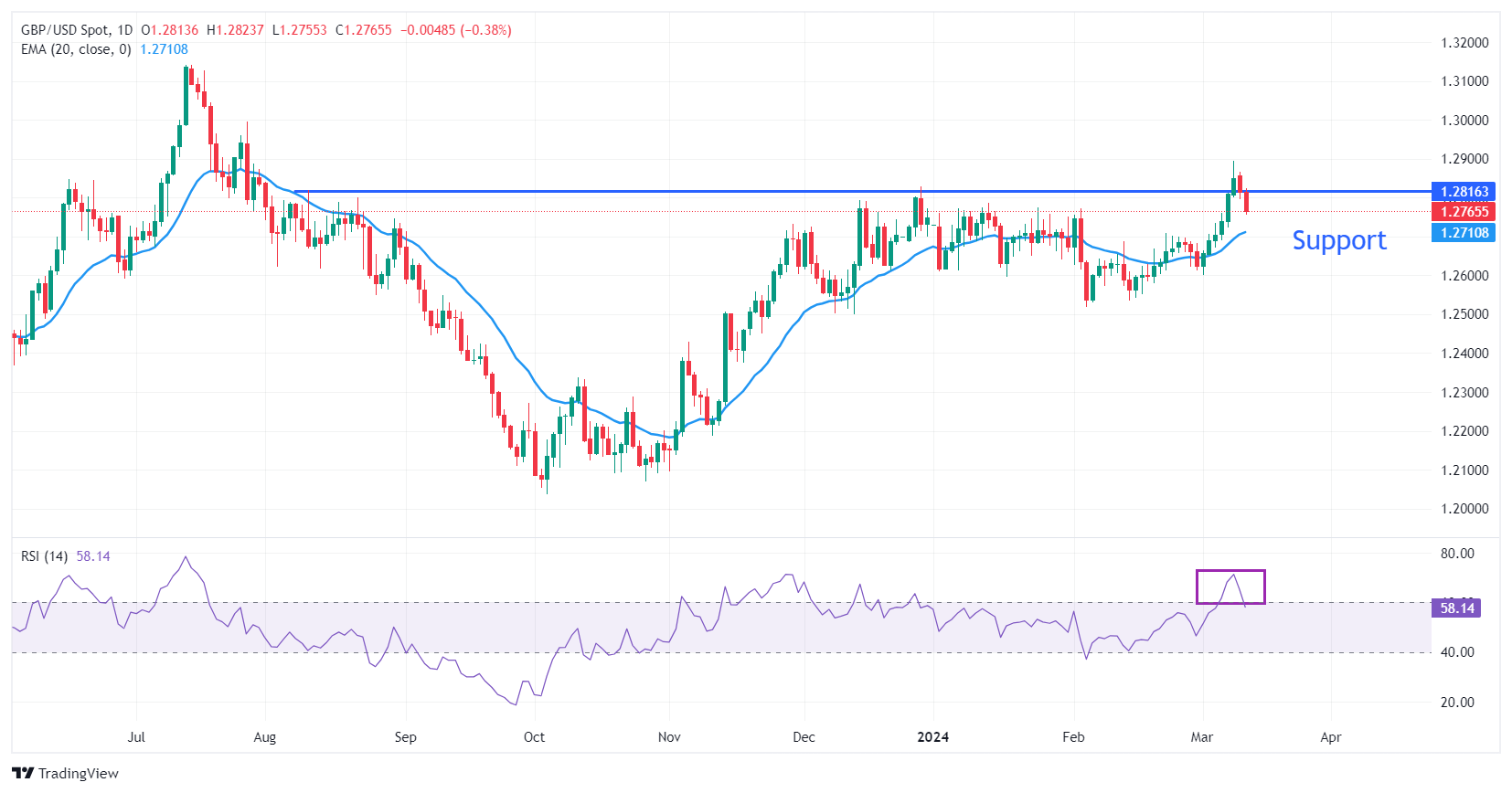- Sterling falls as US inflation data dampens market sentiment.
- UK employment data for the last three months of January indicates weak demand for labor and lower wage growth.
- The cooling of the British labor market increases BoE rate cut hopes.
The British Pound (GBP) suffered an intense sell-off in the early hours of the American session on Tuesday, as the US Bureau of Labor Statistics (BLS) released a Consumer Price Index (CPI) report for February , and the UK Office for National Statistics (ONS) released weak employment data.
U.S. monthly headline inflation rose 0.4%, as expected, up from a 0.3% increase in January. In the same period, core inflation, which removes volatility from food and energy prices, rose 0.4%. Investors expected the core CPI to grow at a slower pace of 0.3%. Looking at the annual figures, the headline CPI accelerated to 3.2%, compared to expectations and the previous release of 3.1%, and core inflation slowed slightly to 3.8%, from 3.9% in January. Investors expect core inflation data to soften sharply to 3.7%.
Figures from the British ONS show that the increase in interest rates by the Bank of England (BoE) and the worsening of the cost of living crisis are beginning to dampen labor market conditions. The UK unemployment rate rose to 3.9%, employers laid off 21,000 workers and average profits grew at a slower pace in the three months to January. Labor market data clearly demonstrates uncertainty over the economic outlook, which could force policymakers at the BoE to start reducing interest rates earlier than planned.
Daily summary of market movements: British pound weakens and dollar recovers
- The British pound falls sharply following softer-than-expected UK employment data (ONS) for the three months ending in January.
- The unemployment rate rose to 3.9%, above expectations and the previous reading of 3.8%. British employers laid off 21,000 workers compared to hiring 72,000 job seekers in the three months ending in December. In February, the job applicant count rose moderately at 16,800 versus expectations of 20,300. In January, people who applied for unemployment benefits were 3,100, revised downward from 14,100.
- Average earnings without premiums grew 6.1%, compared to expectations and the previous reading of 6.2%. Earnings, including premiums, rose at a slower pace of 5.6%, versus the consensus of 5.7% and the previous reading of 5.8%.
- The pace of decline in average earnings (with and without bonuses) in the three months ending in January is greater than expected by market participants. The slowdown in wage growth is expected to allow Bank of England policymakers to consider rate cuts sooner than expected.
- In contrast, on Monday, Catherine Mann, head of economic policy at the BoE, warned that there is still a long way to go to reduce inflation sustainably to the desired target of 2%. Mann was one of two policymakers who voted in favor of a rate hike at the February policy meeting.
- This week, the British pound will continue to move as investors focus on the UK's monthly Gross Domestic Product (GDP) and factory data for January, due to be released on Wednesday.

The British Pound falls below the 1.2800 round support against the US Dollar following uninspiring British labor market data. The short-term appeal of the GBP/USD pair remains bullish as the 20-day EMA at 1.2720 tilts north. The pair has corrected from the seven-month high of 1.2894 to near horizontal support drawn from the August 10 high at 1.2819.
The 14-period Relative Strength Index (RSI) is just inches from its recent high of 71.33, but overall momentum remains bullish.
Inflation FAQ
Inflation FAQ
What is Inflation?
Inflation measures the rise in prices of a representative basket of goods and services. General inflation is usually expressed as a month-on-month and year-on-year percentage change. Core inflation excludes more volatile items, such as food and fuel, which can fluctuate due to geopolitical and seasonal factors. Core inflation is the figure economists focus on and is the target level of central banks, which are mandated to keep inflation at a manageable level, typically around 2%.
What is the Consumer Price Index (CPI)?
The Consumer Price Index (CPI) measures the variation in prices of a basket of goods and services over a period of time. It is usually expressed as a percentage of inter-monthly and inter-annual variation. Core CPI is the target of central banks as it excludes food and fuel volatility. When the underlying CPI exceeds 2%, interest rates usually rise, and vice versa when it falls below 2%. Since higher interest rates are positive for a currency, higher inflation usually translates into a stronger currency. The opposite occurs when inflation falls.
What is the impact of inflation on currency exchange?
Although it may seem counterintuitive, high inflation in a country drives up the value of its currency and vice versa in the case of lower inflation. This is because the central bank will typically raise interest rates to combat higher inflation, attracting more global capital inflows from investors looking for a lucrative place to park their money.
How does inflation influence the price of Gold?
Gold was once the go-to asset for investors during times of high inflation because it preserved its value, and while investors often continue to purchase gold for its safe haven properties during times of extreme market turmoil, this is not the case. most of the time. This is because when inflation is high, central banks raise interest rates to combat it.
Higher interest rates are negative for Gold because they increase the opportunity cost of holding Gold versus an interest-bearing asset or placing money in a cash deposit account. On the contrary, lower inflation tends to be positive for Gold, as it reduces interest rates, making the shiny metal a more viable investment alternative.
Source: Fx Street
I am Joshua Winder, a senior-level journalist and editor at World Stock Market. I specialize in covering news related to the stock market and economic trends. With more than 8 years of experience in this field, I have become an expert in financial reporting.







